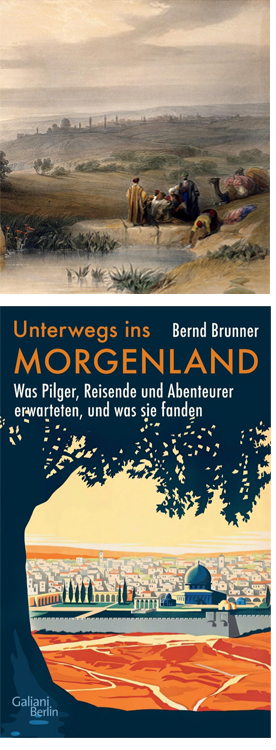
Historical Palestine was for pilgrims from Europe a destination of longing and promise. Unlike Rome, which owed its attraction to the martyrs and the papacy, Palestine stood for the events handed down in the Gospels. It was home to Jewish kingdoms before becoming part of the Roman and Byzantine Empires and the various Islamic empires that followed. Since the sixteenth century, the Ottomans, whose rule continued until the early twentieth century, had added a new layer to the history of Palestine.
By making the journey, pilgrims could absolve themselves of their sins, be knighted, and pray for the fulfillment of wishes. Many of them wanted to experience the land and get closer to the mystery that surrounded these places. From the late eighteenth century, Western explorers and adventurers also began to come to Palestine. Soon, missionaries along with tourists arrived. Furthermore, in the second half of the nineteenth century, Zionist aspirations took on more concrete forms.
Unlike journeys to other regions of the world, the pilgrims' journey to the Holy Land involved a search for traces of their own past. But the Christianity they encountered there was different. The Oriental Christians were not only foreign in appearance, but also in their interpretation of the faith. The journey thus became a touchstone for their own faith. Many travelers were plunged into a crisis by the obvious discrepancy between expectation and reality. In addition, Jews and Muslims complicated the picture. In most cases, visitors lumped people who seemed foreign to them together as "Orientals".
The Holy Land became a stage of encounters with the different representatives of the religions. A dreamland, a projection surface for the biblical, a place of fulfillment and disillusionment.
Bernd Brunner traces the observations and encounters of these travelers and puts them in a larger historical context. After a brief outline of the history of pilgrimages to the Holy Land, he unfolds a multifaceted and hitherto little noticed chapter of the West's encounter with the Middle East some time before the British mandate and the founding of the State of Israel.
"A fascinating collection of stories of pilgrims, scientists, and adventurers. ... As an author well versed in cultural history, Bernd Brunner has a great sense for the entertaining things or the oddities that go hand in hand with pilgrimages. He makes full use of this, is very adept at finding sources. You really get all kinds of beautifully edited travelogues with wonderful sources and precise moments, so the whole book is really very, very entertaining."
Alexander Cammann, Die Zeit
"Israel and the Palestinian territories are located in a region considered holy by Jews, Christians, and Moslems. And while the timing of the book’s publication was unplanned, it is fortuitous: Brunner’s account depicts this place, (yet again) so fought over, as the site of more or less peaceful encounters and spirituality."
Matthias Heine, Welt am Sonntag
"His book can be read as a very special history that tells us a lot about people and their beliefs, about religions and preconceptions and we are also enlightened about the history of Palestine and Israel. A book that is definitely worth recommending, especially at this point in time."
Johannes Schröer, Domradio (radio of the Catholic church, Cologne)
"They Came to the Holy Land’ will appeal to anyone who is interested in understanding more of the background to the current situation in Israel and Gaza. It offers particular insight into how changing attitudes towards the Holy Land throughout the world led to the Balfour declaration in the early 1900s. While the book includes several figures from German history, including Martin Luther and Kaiser Wilhelm II, the material generally takes an international view of the journeys made to the Holy Land, consolidating its broad appeal."
New Books in German
Germany: Galiani Berlin bei Kiepenheuer & Witsch, 2024
(translation rights: Aleksandra Erakovic, aerakovic@kiwi-verlag.de)